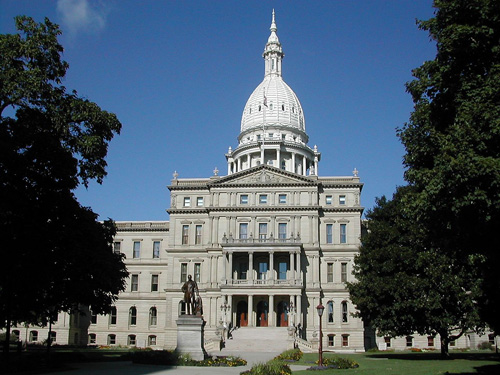
Michigan State Capitol, photographer, Brian Charles Watson
On the final days of the lame duck legislative session of 2012, the majorities in the Michigan House and Senate voted to give the Governor enhanced powers to appoint emergency managers who could take over cities and depose the duly elected boards and city councils, nullify union contracts and, after an audit was performed, allow the city to file for bankruptcy. The justification -- Michigan cities were experiencing a dire financial crisis, especially Detroit, and emergency measures were needed.
One month earlier, Michigan voters had repealed by a margin of 53 percent to 47 percent a similar law after collecting over 600,000 signatures to put the measure on the ballot. This exercise in democracy didn't deter the Republican governor, Rick Snyder, who'd campaigned as a moderate, but after taking office in 2011 blazed a trail championing legislation to deny benefits to same sex couples, place burdensome regulations on abortion clinics and transform Michigan, the home of the United Auto Workers, into a "right to work" state.
Governor Snyder signed the revised emergency manager bill and turned his sights on the ailing city of Detroit by appointing lawyer Kevyn Orr, who'd worked on Chrysler's bankruptcy, to take the helm as Detroit's emergency manager.
No one will argue that Detroit's finances are in good shape and there's nothing to worry about. But is what Governor Snyder and the state legislature did more about union busting than fixing Detroit? After all, anyone who has ever been through bankruptcy can tell you that life after bankruptcy only gets harder.
An average pension for a retired Detroit cop is about $19,000 a year. The firefighters' pensions are slightly more generous and they often have another pension since their schedules of several days on and then off frees them up to hold down side jobs. Neither one receives Social Security because Detroit, like many other municipalities, allowed police and firefighters to opt out of that federal program.
The Michigan constitution is very clear about the sanctity of public pensions. Article 9, Section 24, states that pension obligations may not be "diminished or impaired." So, cutting a public pension is constitutionally prohibited in Michigan and in six other states. A fact that's caught the attention of the Manhattan Institute, a conservative think tank, that wants those states to amend their constitutions.
Snyder's efforts are being watched by the Manhattan Institute and other conservative groups that share its desire for the U.S. Bankruptcy Judge, Steven Rhodes, to decide in the Detroit case that federal law takes precedence over the State constitution so they can keep working to undo the protections afforded public pensions in other states.
Solving the underfunded pension should be the responsibility of the State. Which could mean raising taxes, cutting corporate subsidies and tax breaks or cancelling other pet programs. All are anathema to the Snyder administration.
The great migrations after World War I and World War II attracted waves of African-Americans who fled the crushing poverty of the South where their votes, if they could vote, often didn't count, to come to Detroit for the good jobs in the auto industry. Those jobs are gone and the people have been disenfranchised. Ironically, the car companies have fled South and overseas leaving their workers behind. In Detroit alone, the 296,000 manufacturing jobs that existed in 1950 have been reduced to just under 30,000 now.
These once mostly union jobs created a working middle class, that paid taxes that built schools, parks, recreation facilities, paved the roads, maintained the water system, kept the streetlights on, hired the police, firefighters, teachers and librarians and kept the museums doors open. Their spending also pumped up the economy and provided countless other jobs. And yes, kept revenue flowing into the pension funds.
What's needed is more than a bankruptcy that divvies up the silverware on the Titanic. This will take considerably more of an investment than the $300 million aid package that the Obama administration unveiled last month.
We need state, regional and national policies, along with funding, that will address the long term, systemic problems of cities like Detroit. Sadly, Governor Snyder's bankruptcy plan seems more about weakening unions and protecting corporate subsidies and tax breaks than it does about shoring up Motown for the long haul. This is not just a shame for the people of Detroit, it's a travesty for all Americans.
